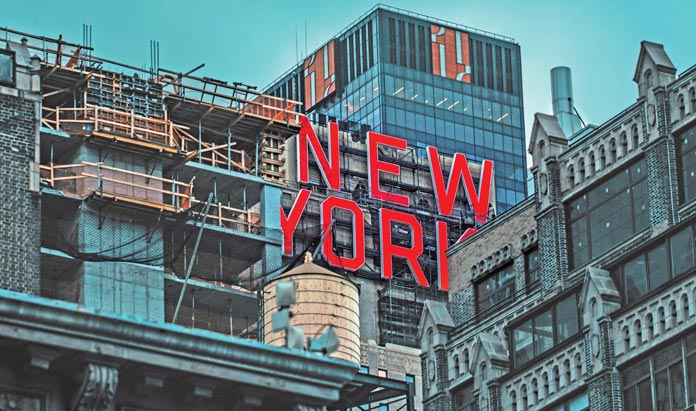
Article contributed by Michael Dinowitz, Ellenoff Grossman & Schole LLP
On May 26, 2020, legislation was enacted in NYC which has been characterized by some as a shield against personal liability under commercial leases during the COVID-19 pandemic. As summarized in a statement by Carlina Rivera, the City Council Member who sponsored the bill, “[w]ith the signing of my bill, any small business owner with a personal liability clause in their lease will see that provision temporarily suspended.” Rivera continued “[t]hey will no longer have to fear their landlord going after their personal life savings and assets because of a disaster no one saw coming.”
While the law may provide some measure of protection to tenants, it may not exactly live up to the portrayal given by the sponsoring City Council member and others. In addressing a hospitality industry group on this topic last week, I realized that there’s substantial confusion surrounding this new enactment. This article attempts to parse through some misconceptions about NYC commercial lease personal liability protections.
The law (N.Y.C. Council Int. No. 1932-A, § 1. [1] N.Y.C. Council Int. No. 1932-A, § 2) applies to natural persons (meaning, a flesh and blood human) who are not the tenant who signs a guaranty in “a commercial lease or other rental agreement” for property within NYC. In other words, the law seeks to address the situation where the tenant under the lease is a limited liability, corporation or other entity and the lease is personally guaranteed by an individual. The law states that such a person will not be personally liable “upon the occurrence of a default or other event,” in full or in part “for payment of rent, utility expenses or taxes owed by the tenant” or for “fees and charges relating to routine building maintenance owed by the tenant” occurring between March 7, 2020 and September 30, 2020.
In addition, two conditions must be satisfied: (1) The tenant’s business must fall under one of three categories of business adversely impacted by COVID-19 pandemic and subjected to the certain of Gov. Cuomo’s early executive orders, specifically: (a) restaurants and bars that were required to cease serving food or beverages for on-premises consumption; (b) retail businesses that were subject to in-person limitations (c) businesses forced to close to the public completely, and (2) the default or other event causing liability must occur between March 7 and September 30, 2020.
The new legislation also states that any attempt to enforce a personal guaranty provision that a landlord knows or reasonably knows is not enforceable under this new legislation constitutes tenant harassment.
So it seems straight forward, right? Well, not exactly. It appears that in the haste to get some form of tenant protection measures passed quickly, less than careful attention was employed by the City Council in drafting this legislation. The act addresses personal liability under a “provision in a commercial lease or other rental agreement (emphasis added) involving real property” of “natural persons who are not the tenant under such agreement.” There are indeed some glaring flaws in the legislation’s’ language to be observed. The law, which was aimed at helping retail business such as barber shops/salons, restaurants and bars, gyms, health food stores and similar retail businesses, does not take into account that many of these establishments are “mom and pop” stores that are not infrequently owned individually and not through an entity.
Therefore, the statute which only applies to “natural persons who are not the tenant”, will be of no help in such situations. The law also doesn’t consider that the vast majority of lease guaranties are accomplished via separate guaranty instrument and not in the lease itself and therefore do not fall within the purview of a “provision in commercial lease or rental agreement”). While this may seem like lawyer nit picking to some, this imprecise language leaves landlords with ample room to argue and posture in litigation and certainly leaves the tenant and guarantor community little less certainty in relying on safeguards they thought they were getting.
Landlords will also undoubtedly be creative and pursue other categories of claims and damages not particularly listed in the bill (“rent, utility expenses or taxes owed by the tenant” or “fees and charges relating to routine building maintenance owed by the tenant”).
The impreciseness of the statute will undoubtedly leave the door open for other creative strategies to be employed by Landlords. For instance, most lease guaranties state that the Guarantor’s liability of runs from the delivery of the guaranty, and is not contingent upon certain future events in contrast with the law’s language cites liability occurring “upon the occurrence of a default or other event.”
In addition, since the law applies only to defaults occurring between March 7 and September 30, Landlord may get crafty in how they characterize the time of a default (i.e., apply the security deposit and then on October 1 demand a replenishment of the security, failing which the Landlord will thereafter declare a default which occurs after the time window covered by the statute. We will also inevitably see constitutional challenges to this law questioning the City’s ability to interfere in private contract rights weighed against its interest to safeguard the public in violation of Article I, § 10 of the Constitution.
A couple of additional notes of interest. The law does not have a sunset so that while the March 7 to September 30 window of applicability is clear, it appears that if all of the other challenges are overcome by the tenant guarantor, the Landlord would be prohibited from enforcing its claims relating to this time period in perpetuity. Also, Landlords will need to be extremely cautious in their dealings with their tenants, in order to avoid triggering unjustified tenant harassment claims and all emails, notices, conversation and other communications will need to be carefully vetted in this regard.
Although there is no way to foretell how all of this will shake out from either a practical or legal perspective, there is one sure thing that can be predicted with certainty – it will be interesting.
 Michael Dinowitz, a commercial real estate and general business attorney for over 30 years, is a partner in the Real Estate Group at the law firm of Ellenoff Grossman & Schole LLP in NYC. His experience set is diverse and includes: the acquisition, disposition, financing and leasing of commercial real estate in most asset classes including office, hospitality, multi-family and retail; workouts and capital repositioning; drafting and negotiating of joint venture agreements; business transactions and general business agreements. Michael often serves as outside general counsel to family offices and operating companies. He can be reached at (646) 895-7127 or mdinowitz@egsllp.com.
Michael Dinowitz, a commercial real estate and general business attorney for over 30 years, is a partner in the Real Estate Group at the law firm of Ellenoff Grossman & Schole LLP in NYC. His experience set is diverse and includes: the acquisition, disposition, financing and leasing of commercial real estate in most asset classes including office, hospitality, multi-family and retail; workouts and capital repositioning; drafting and negotiating of joint venture agreements; business transactions and general business agreements. Michael often serves as outside general counsel to family offices and operating companies. He can be reached at (646) 895-7127 or mdinowitz@egsllp.com.























